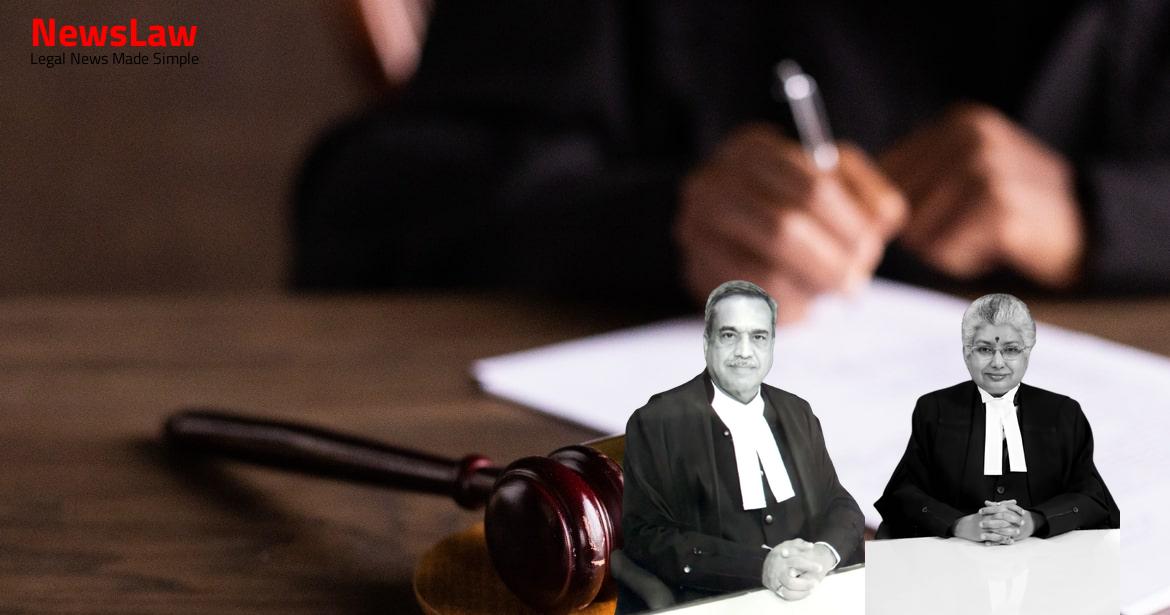Explore the complexities of property succession in the recent monumental ruling by the Supreme Court of India. The judgment delves into the dispute over the inheritance of properties left by late Nawab Raza Ali Khan, involving considerations of Rule of Primogeniture and the Law of Rulership. Discover the key aspects of this legal saga and the implications for succession of properties.
Facts
- Plaintiff, the granddaughter of Nawab Raza Ali Khan, filed a suit for partition, accounts, mesne profits of the properties left by Nawab Raza Ali Khan.
- The instrument of accession between Governor General of India and Nawab of Rampur granted personal rights, privileges, and titles to the Nawab.
- The privileges included exemption from certain laws, jagirs, personal properties, and marriage expenses for family members.
- Nawab Raza Ali Khan merged the State of Rampur into the Union of India as per the merger agreement of 15.05.1949.
- After Nawab’s death, Rampur became a centrally administered Chief Commissioner’s Province.
- Nawab Raza Ali Khan was declared a ruler under Article 366(22) of the Indian Constitution.
- The plaintiff withdrew the suit filed in 1970 with liberty to file a fresh suit, which was filed on 07.01.1972.
- Defendant No 1’s appeal against the Delhi High Court judgment was dismissed by this Court.
- The certificate quashed by the Delhi High Court was not to be used by either party in the ongoing civil litigation over the property.
- The suit, O.S. No 4 of 1972, was withdrawn by the High Court of Allahabad and tried independently.
- The learned Single Judge dismissed the suit on 31.07.1996.
- An appeal was made to a Division Bench of the Allahabad High Court, which also dismissed the appeal through two separate concurring judgments.
Also Read: Enforcement of Foreign Award: Case of Oscar Investments Limited and RHC Holding Private Limited
Issue
- Issue at hand: Succession to properties declared as private by erstwhile ruler in agreement of accession with Dominion of India.
- Question: Will succession be governed by rule of Gaddi or personal law applicable to the ruler?
- Key consideration in present appeals.
Also Read: NGOs Substantial Financing Case: Supreme Court’s Judgment on Public Authority Definition
Arguments
- The properties held by Nawab Raza Ali Khan were to devolve on his eldest son by applying the rule of primogeniture or be governed by Muslim Personal Law (Shariat) Application Act, 1937 and devolve on all his legal heirs.
- Mr. Sudhir Chandra argued that the personal law should apply and the property should be governed by the rule of primogeniture as Nawab Raza Ali Khan was a recognized ruler by the Constitution.
- The ruler of Sonepur contended that as a ruler, he was immune from liability of taxation for his private properties within and outside his territory.
- However, the defendants argued that the property was attached to the ‘Gaddi’ of the State of Rampur and hence governed by the law of succession applicable to Rampur’s rulership.
- Justice M.C. Mahajan held that properties declared as private by the covenant of merger did not guarantee perpetual existence and Article 362 did not prohibit their acquisition by the State.
- Mr. A.K. Ganguli supported the arguments by citing the ‘second privy purses case’ and relevant provisions of the Constitution.
- It is noted that the Muslim Personal Law (Shariat) Application Act, 1937 was applicable to the State of Rampur where Nawab Raza Ali Khan resided.
- The first Constitution Bench judgment relied upon was Visweshwar Rao v. The State of Madhya Pradesh, which dealt with the takeover of private properties of a ruler under a merger agreement.
- The case discussed the challenging of the 26th Amendment, 1971 to the Constitution by erstwhile rulers which impacted benefits given to rulers under Articles 291 and 362.
- It was asserted that after ceding the property to the Dominion of India and with the enforcement of the Constitution of India, Nawab Raza Ali Khan was only a ruler for specific purposes, not for all including succession.
- Senior counsel Mr. Sudhir Chandra relied on the Dholpur case
- Senior counsel Mr. A. K. Ganguli relied on the Nabha case
Also Read: Maintenance Rights of Divorced Women: Reconsideration Plea by Mr. Debal Banerjee
Analysis
- The agreements entered into by the Rulers of the States with the Government of India were simple documents relating to the accession and integration.
- The definition of ‘Ruler’ in relation to an Indian State is clarified in clause (22) of Article 366.
- The succession to the estate of Nawab Raza Ali Khan opened in the year 1966, prior to the 26th Amendment Act.
- The rulers enjoyed rights to privy purses, private properties, and privileges only because of the Constitution; otherwise, they were ordinary citizens.
- The distinction between recognition of rulership and succession to private properties of the Ruler must be kept in mind.
- The judgment in the Dholpur case was not set aside or upset in the Princes Privy Purses case.
- The ruling princes had the right to decide to which Dominion, India or Pakistan, they were to cede and had personal privileges granted by the Constitution.
- After the Constitution was adopted, the Rulers enjoyed their rights by the force of the Constitution, becoming ordinary citizens.
- The guarantees and assurances given under the Constitution were independent of previous agreements with the Government.
- Upon the death of the ruler, succession to private properties was governed by personal laws.
- The rulers were considered rulers only in name, retaining their original title, a privy purse, and some privileges.
- The succession of private properties was determined by personal laws following the death of the ruler.
- The Nawab is entitled to full ownership, use, and enjoyment of all his private properties on the date of the agreement.
- Parliament and Legislature must consider guarantees given under any covenants or agreements with the ruler of an Indian State.
- Courts are barred from entertaining disputes arising from treaties or agreements made before the Constitution by rulers of Indian States.
- The Dominion Government guarantees succession to the gaddi of the State and the Nawab’s personal rights, privileges, immunities, dignities, and titles.
- An inventory of all immovable property, securities, and cash balances held as private property must be furnished to the Dominion Government by June 30, 1949.
- Disputes regarding whether an item is the Nawab’s private property or State property will be referred to a judicial officer nominated by the Government of India, with the officer’s decision being final and binding.
- The recognition of Rulership is not an indicia of property but it entitles the Ruler to the enjoyment of the Privy Purse and personal rights, privileges, and dignities mentioned in the Constitution.
- The Princes Privy Purses case dealt with executive powers of the State and held that executive orders cannot flout the mandates of the Constitution.
- Guarantees and assurances to the Ruler are limited to personal rights, privileges, and dignities of the ruler qua a ruler and do not extend to personal property.
- The properties of the ruler, whether private or State properties, were subject to detailed examination during the integration of States.
- Recognition of Rulership by the President is an exercise of political power and not bound up with private property rights of the Ruler.
- The properties recognized as private properties of the Ruler were so even before recognition and are not a result of recognition.
- The distinction between private and State properties is crucial, and the right to private properties of the Ruler is governed by personal law of succession.
- Recognition of Rulership does not confer property rights but is an exercise of political power by the President.
- The rulers had lost their territories, rights to rule, and were left only with certain privileges and property rights.
- The succession to private properties of the Ruler is determined by personal law, not just by recognition of Rulership.
- The ratio of 51:49 in favor of the respondent is accepted.
- The shares agreed upon by the parties are held to be correct.
Decision
- Parties entitled to inherit properties of late Nawab Raza Ali Khan as per personal law and shares set out in plaint para 9-F.
- Trial Court to appoint a Commissioner to evaluate the value of moveable properties left behind by Nawab Raza Ali Khan.
- Defendants to render accounts of incomes, profits, and benefits inherited or enjoyed.
- Determination of any sale or transfer of properties by defendants during proceedings.
- Option for applicants to file a Civil Suit to establish their rights.
- District Judge to urge parties to settle division of properties by mutual agreement.
- Deduction of value from shares for any sold or transferred properties by defendants.
Case Title: TALAT FATIMA HASAN THROUGH HER CONSTITUTED ATTORNEY SH. SYED MEHDI HUSAIN Vs. NAWAB SYED MURTAZA ALI KHAN (D) BY LRS
Case Number: C.A. No.-001773-001773 / 2002



